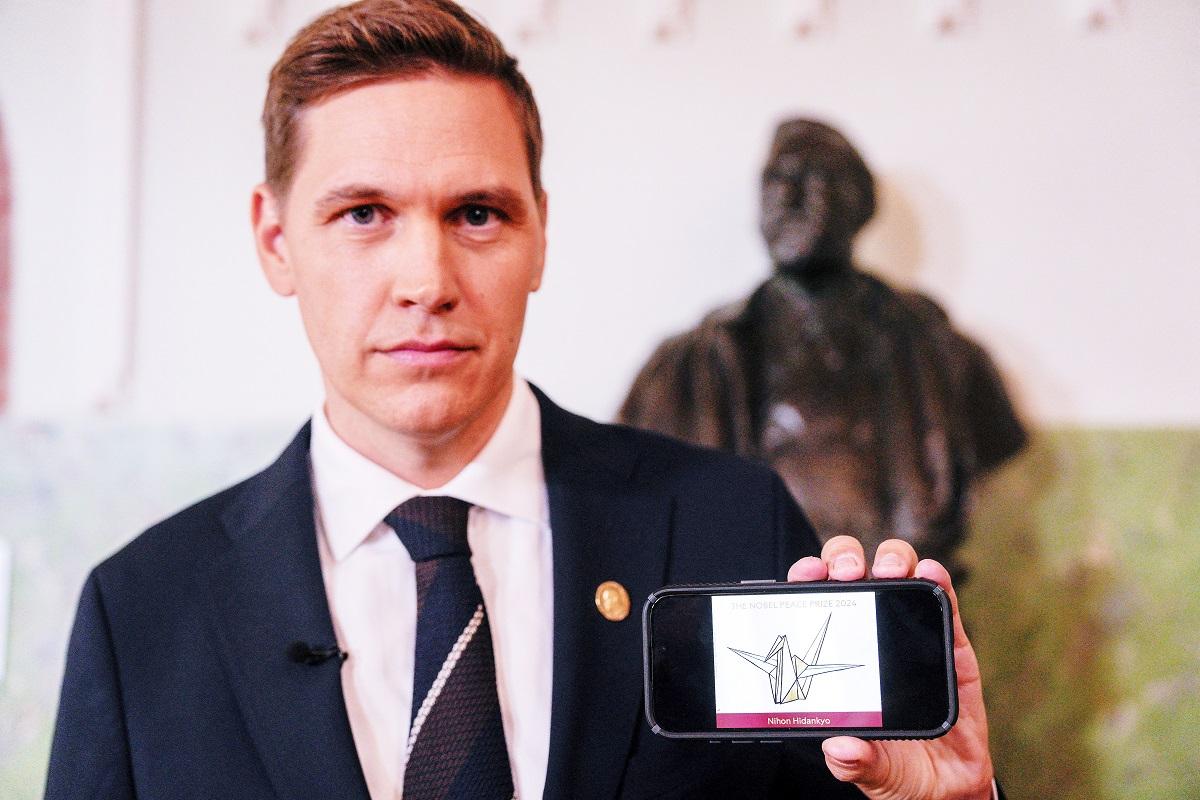Nihon Hidankyo’s Nobel Peace Prize Highlights Fears of Nuclear Build-Up; Nobel Committee Head Warns of Destructive Power

The head of the Norwegian Nobel Committee, Joergen Watne Frydnes, holds a mobile phone displaying an illustration with the name of the 2024 Nobel Peace Prize winner, the Japanese organization Nihon Hidankyo, in Oslo on Friday.
15:53 JST, October 12, 2024
LONDON — The tireless efforts of Nihon Hidankyo, or Japan Confederation of A- and H-Bomb Sufferers Organizations, toward the abolition of nuclear weapons were recognized with the 2024 Nobel Peace Prize.
Next year will mark 80 years since atomic bombs were dropped on Hiroshima and Nagasaki. While witness testimonies of atomic bomb survivors, or hibakusha, have proven valuable, concerns are growing over the build-up and spread of nuclear arms.
‘Annihilation’ of civilization feared
In stating the reason for awarding the prize to Hidankyo, Jorgen Watne Frydnes, chairman of the Norwegian Nobel Committee, mentioned the upcoming anniversary.
He went on to state that it is worth pointing out that “today’s nuclear weapons have far greater destructive power. A nuclear war could destroy our civilization.”
The Nobel Peace Prize has been awarded on multiple occasions to individuals and organizations calling for nuclear abolition, starting with the International Physicians for the Prevention of Nuclear War in 1985.
“Pugwash Conferences on Science and World Affairs” and their founders were awarded the Peace Prize in 1995; then U.S. President Barack Obama, who called for a “world without nuclear weapons,” won in 2009; and the International Campaign to Abolish Nuclear Weapons, or ICAN, a coalition of civil society organizations appealing for nuclear abolition, won in 2017.
The Nobel Prize Committee’s repeated awarding of the Peace Prize for “antinuclear” activities is an indication of its sense of crisis that, should a nuclear weapon be used again, it could lead to global destruction.
China’s nuclear build-up
Yet, the international community is currently far from realizing nuclear abolition. Although the Nuclear Non-proliferation Treaty (NPT) limits the possession of nuclear weapons to five countries — the United States, the United Kingdom, France, China, and Russia — the reality is very different.
According to a report released by the Stockholm International Peace Research Institute (SIPRI) in June, besides these five nuclear powers, India, Pakistan, Israel, and North Korea have nuclear warheads, bringing the number of nuclear states to nine, with the total estimated number of nuclear warheads standing at 12,121.
Russia possesses 5,580 nuclear warheads and the United States has 5,044, combining for about 90% of the global total. China owns 500 nuclear warheads, up 90 from the previous year, and North Korea has 50 warheads, up 20 from a year earlier.
China, in particular, has been rapidly beefing up its nuclear capability in recent years.
SIPRI predicted that China will come to possess almost as many intercontinental ballistic missiles as the United States and Russia within the next 10 years.
In the Middle East, the administration of former U.S. President Donald Trump pulled out of the Iran nuclear accord, an agreement concluded between Iran and six countries, including the United States, the United Kingdom, and Russia.
Iran has been boosting its production of highly enriched uranium, which can be used to make a nuclear bomb.
The framework for nuclear disarmament and arms control by the United States and Russia is also in danger of collapse.
The idea of a new arms control framework established by the United States, Russia, and China to replace the New Strategic Arms Reduction Treaty (New START), which will expire in 2026, has been put forward. However, there is no prospect for such an idea to be realized.
Top Articles in Society
-

Producer Behind Pop Group XG Arrested for Cocaine Possession
-

Man Infected with Measles Reportedly Dined at Restaurant in Tokyo Station
-

Man Infected with Measles May Have Come in Contact with Many People in Tokyo, Went to Store, Restaurant Around When Symptoms Emerged
-

Woman with Measles Visited Hospital in Tokyo Multiple Times Before Being Diagnosed with Disease
-

Australian Woman Dies After Mishap on Ski Lift in Nagano Prefecture
JN ACCESS RANKING
-

Producer Behind Pop Group XG Arrested for Cocaine Possession
-

Japan PM Takaichi’s Cabinet Resigns en Masse
-

Man Infected with Measles Reportedly Dined at Restaurant in Tokyo Station
-

Israeli Ambassador to Japan Speaks about Japan’s Role in the Reconstruction of Gaza
-

Videos Plagiarized, Reposted with False Subtitles Claiming ‘Ryukyu Belongs to China’; Anti-China False Information Also Posted in Japan























